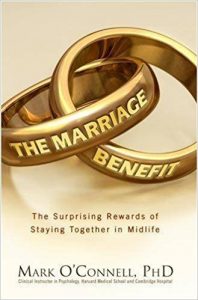The Marriage Benefit: The Surprising Rewards of Staying Together in Midlife
 “Think and talk about commitment in positive terms,” Mark O’Connell advises couples in The Marriage Benefit. Nowadays, he says, “commitment can legitimately be considered a radical, even ‘cool’ choice, not a conventional one.” O’Connell is a clinical instructor in psychology at Harvard Medical School and Cambridge Hospital in Massachusetts.
“Think and talk about commitment in positive terms,” Mark O’Connell advises couples in The Marriage Benefit. Nowadays, he says, “commitment can legitimately be considered a radical, even ‘cool’ choice, not a conventional one.” O’Connell is a clinical instructor in psychology at Harvard Medical School and Cambridge Hospital in Massachusetts.
The author’s 2008 book stands out among the diversity of books about marriage lining the shelves of our larger bookstores for its conviction that a lasting marriage makes sense and can be very good for people. If a number of popular, “secular” books take marriage less than seriously, a growing number appear to recognize that lasting marriage is of great value to spouses, children and society at large.
Springboard Press, O’Connell’s publisher, offers a variety of books for the baby-boomer generation. Not surprisingly, then, many of O’Connell’s observations are directed to somewhat older couples, encouraging them not to overlook the continued potential in their relationships.
This book aims to “illustrate a critical truth” that the author believes often is overlooked “in our ‘me-first’ culture: When we remain faithful and committed to each other over time, when we put the ‘we’ of a relationship before the ‘I’ of our individual selves, we don’t diminish those individual selves, we strengthen them.”
What is needed, however, is “a definition of love” that while embracing passion and romance, “still encourages us to appreciate the way in which love can help us to evolve and grow … through all the seasons of married life.”
The Marriage Benefit is structured around “eight resolutions” that O’Connell explains are meant to serve as “North Stars” when people lose their way. For example, the resolutions encourage couples to “embrace a longer-lasting definition of love,” to celebrate their differences, to give up habits and addictions, to “find freedom through commitment.”
Taken together, O’Connell says, the eight resolutions “answer the question, ‘Why stay together?’ in an emphatically positive way: ‘Because our long-term intimate relationships can help us to become our best selves.’”
One chapter in the book is devoted to the third of the resolutions, which exhorts couples to “have real sex.” What that sounds like and what it actually means may not be quite the same, however. This resolution urges couples take steps toward a healthy sexuality in their relationship.
O’Connell makes clear his concern that “the sexual freedom and permissiveness” many baby boomers once reveled in “has evolved into a sexual culture that now, ironically, shackles and oppresses us.” He asks, “Is there any way out of this mess?”
Responding to that question, O’Connell encourages couples to recognize their opportunity “to find and sustain [their] sexualities in the face of what is fast becoming an epidemic of sexual meaninglessness and disconnection.”
In counseling sessions with O’Connell, it appears couples somewhat frequently raise sexual issues. In recounting a few conversations in which spouses frankly describe such issues, it seems his goal as a counselor is to help couples recognize that their real happiness will be found not when they retreat or escape from each other sexually, but when they recognize that they can continue to grow together.
Something O’Connell says about infidelity seems pertinent here. He writes, “More often than not, an affair is … a means of avoiding deeper, more meaningful and often more risky intimacy. It is a way not of moving toward something better, but of moving away from something harder.”
I want to mention the author’s strong criticism of pornography in this context. Pornography, he insists, leaves people feeling “empty and numb.” Healthy sexuality “features meaning and connection,” and “is not characterized by numbness, overstimulation and control – the principles of pornography,” O’Connell writes.
The “central take-home message” of O’Connell’s book is that people have the power to change, “often in surprising and important ways.” And because spouses tend to know each other inside out, they can “support and challenge each other,” he believes; they can help each other achieve “the kind of growth that comes when we are willing to open ourselves in those places that we are most driven to avoid.”
About the reviewer
David Gibson served for more than 37 years on the Catholic News Service editorial staff.
Disclaimer: Book reviews do not imply and are not to be used as official endorsement by the USCCB of the work or those associated with the work. Book reviews are solely intended as a resource regarding publications that might be of interest to For Your Marriage visitors.




